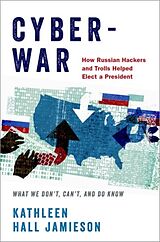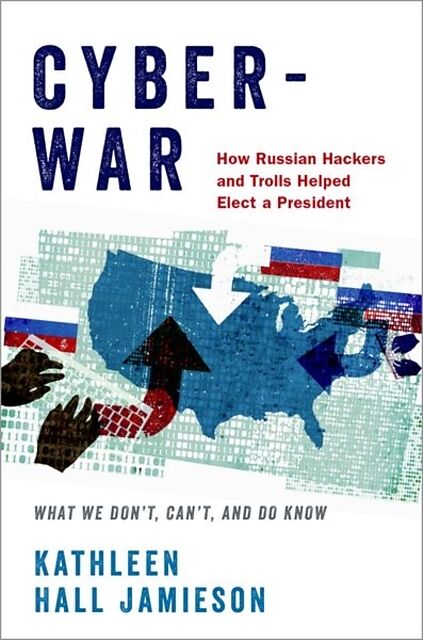Cyberwar
Einband:
Fester Einband
EAN:
9780190915810
Untertitel:
How Russian Hackers and Trolls Helped Elect a President - What We Don't, Can't, and Do Know
Genre:
Politikwissenschaft
Autor:
Kathleen Hall Jamieson
Herausgeber:
Oxford Academic
Anzahl Seiten:
336
Erscheinungsdatum:
22.11.2018
ISBN:
978-0-19-091581-0
Zusatztext One hopes [...] that everyone who studies presidential elections! everyone who safeguards their security! and particularly every journalist who covers them will heed this book. Informationen zum Autor Kathleen Hall Jamieson is the Elizabeth Ware Packard Professor of Communication at the Annenberg School for Communication of the University of Pennsylvania and Director of its Annenberg Public Policy Center. Among her award winning Oxford University Press books are Packaging the Presidency, Eloquence in an Electronic Age, Spiral of Cynicism (with Joseph Cappella), and The Obama Victory (with Kenski andHardy). Klappentext In Cyberwar, the eminent scholar Kathleen Hall Jamieson, who sifted through a vast amount of polling and voting data, is able to conclude with a reasonable degree of certainty that Russian help was crucial in elevating Trump to the Oval Office. Zusammenfassung The question of how Donald Trump won the 2016 election looms over his presidency. In particular, were the 78,000 voters who gave him an Electoral College victory affected by the Russian trolls and hackers? Trump has denied it. So too has Vladimir Putin. Others cast the answer as unknowable.Drawing on path-breaking work in which she and her colleagues isolated significant communication effects in the 2000 and 2008 presidential campaigns, the eminent political communication scholar Kathleen Hall Jamieson marshals the troll posts, unique polling data, analyses of how the press used the hacked content, and a synthesis of half a century of media effects research to argue that, although not certain, it is probable that the Russians helped elect the 45th president of the United States. In the process, Cyberwar tackles questions that include: How extensive was the troll messaging? What characteristics of the social media platforms did the Russians exploit? Why did the mainstream press rush the hacked content into the citizenrys newsfeeds? Was Clinton telling the truth when she alleged that the debate moderators distorted what she said in the leaked speeches? Did the Russian influence extend beyond social media and news to alter the behavior of FBI director JamesComey? After detailing the ways in which the Russian efforts were abetted by the press, social media platforms, the candidates, party leaders, and a polarized public, Cyberwar closes with a warning: the country is ill-prepared to prevent a sequel....
One hopes [...] that everyone who studies presidential elections, everyone who safeguards their security, and particularly every journalist who covers them will heed this book.
Autorentext
Kathleen Hall Jamieson is the Elizabeth Ware Packard Professor of Communication at the Annenberg School for Communication of the University of Pennsylvania and Director of its Annenberg Public Policy Center. Among her award winning Oxford University Press books are Packaging the Presidency, Eloquence in an Electronic Age, Spiral of Cynicism (with Joseph Cappella), and The Obama Victory (with Kenski and Hardy).
Klappentext
In Cyberwar, the eminent scholar Kathleen Hall Jamieson, who sifted through a vast amount of polling and voting data, is able to conclude with a reasonable degree of certainty that Russian help was crucial in elevating Trump to the Oval Office.
Zusammenfassung
The question of how Donald Trump won the 2016 election looms over his presidency. In particular, were the 78,000 voters who gave him an Electoral College victory affected by the Russian trolls and hackers? Trump has denied it. So too has Vladimir Putin. Others cast the answer as unknowable. Drawing on path-breaking work in which she and her colleagues isolated significant communication effects in the 2000 and 2008 presidential campaigns, the eminent political communication scholar Kathleen Hall Jamieson marshals the troll posts, unique polling data, analyses of how the press used the hacked content, and a synthesis of half a century of media effects research to argue that, although not certain, it is probable that the Russians helped elect the 45th president of the United States. In the process, Cyberwar tackles questions that include: How extensive was the troll messaging? What characteristics of the social media platforms did the Russians exploit? Why did the mainstream press rush the hacked content into the citizenrys newsfeeds? Was Clinton telling the truth when she alleged that the debate moderators distorted what she said in the leaked speeches? Did the Russian influence extend beyond social media and news to alter the behavior of FBI director James Comey? After detailing the ways in which the Russian efforts were abetted by the press, social media platforms, the candidates, party leaders, and a polarized public, Cyberwar closes with a warning: the country is ill-prepared to prevent a sequel.
Inhalt
Prologue
Introduction
Part One: Who Did It, Why, and How It May Have Mattered
Chapter One: How Do We Know that the Russians Meddled in the 2016 U.S. Presidential Election?
Chapter Two: A Theory of Communication that Posits Effects
Part Two: The Pre-Requisites of Influence
Chapter Three: Pre-Requisite One: Widespread Messaging
Chapter Four: Pre-Requisite Two: Messages Aligned with Trump's Electoral Interests
Chapter Five: Pre-Requisite Three: Messages to Mobilize Veterans and White Christians, Demobilizing Blacks and Sanders' Supporters, Shifting Liberals to Stein
Chapter Six: Pre-Requisite Four: Well-Targeted Content
Chapter Seven: Pre-Requisite Five: Persuasive Appeals
Part Three: Exposure: How the Russians Affected the News and Debate Agendas in the Last Month of the Campaign
Chapter Eight: The Russian Effect On Press Coverage in October
Chapter Nine: The Effect of the Stolen Emails on the Last Two Presidential Debates
Chapter Ten: The Russian Effect on the Media Agenda in the Last Days of the Election
Part Four: What We Don't, Can't, and Do Know About How Russian Hackers and Trolls Helped Elect Donald J. Trump
Afterword: Lessons
Appendices
Appendix One: Changes in Perceptions of Clinton and Trump in October
Appendix Two: Debate 2 and Debate 3 Exposure Effect on Candidate Trait Evaluations
Appendix Three: Association between Perception Changes and Vote Intentions
References

Leider konnten wir für diesen Artikel keine Preise ermitteln ...
billigbuch.ch sucht jetzt für Sie die besten Angebote ...
Die aktuellen Verkaufspreise von 6 Onlineshops werden in Realtime abgefragt.
Sie können das gewünschte Produkt anschliessend direkt beim Anbieter Ihrer Wahl bestellen.
Loading...
Die aktuellen Verkaufspreise von 6 Onlineshops werden in Realtime abgefragt.
Sie können das gewünschte Produkt anschliessend direkt beim Anbieter Ihrer Wahl bestellen.
| # | Onlineshop | Preis CHF | Versand CHF | Total CHF | ||
|---|---|---|---|---|---|---|
| 1 | Seller | 0.00 | 0.00 | 0.00 |
